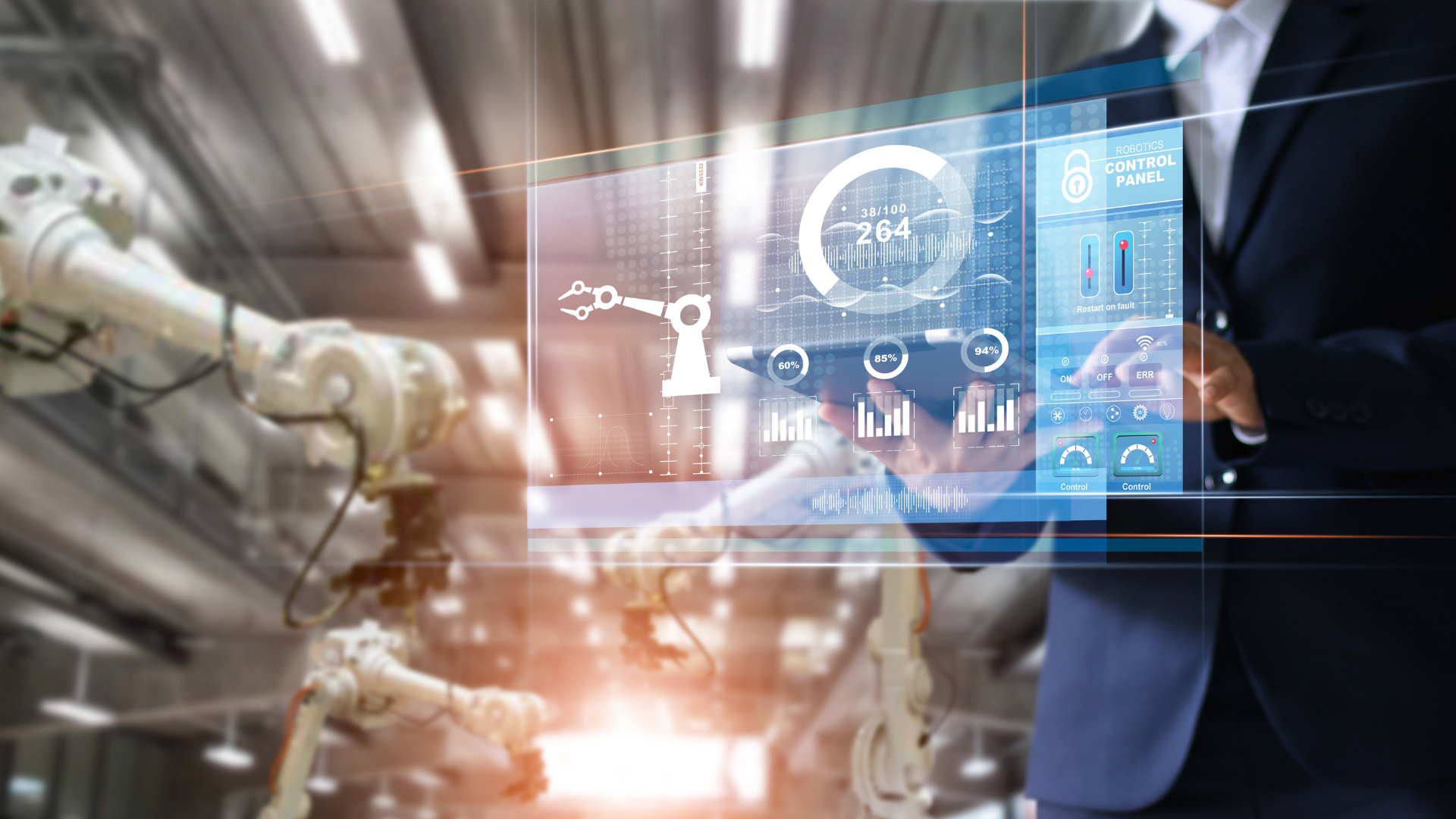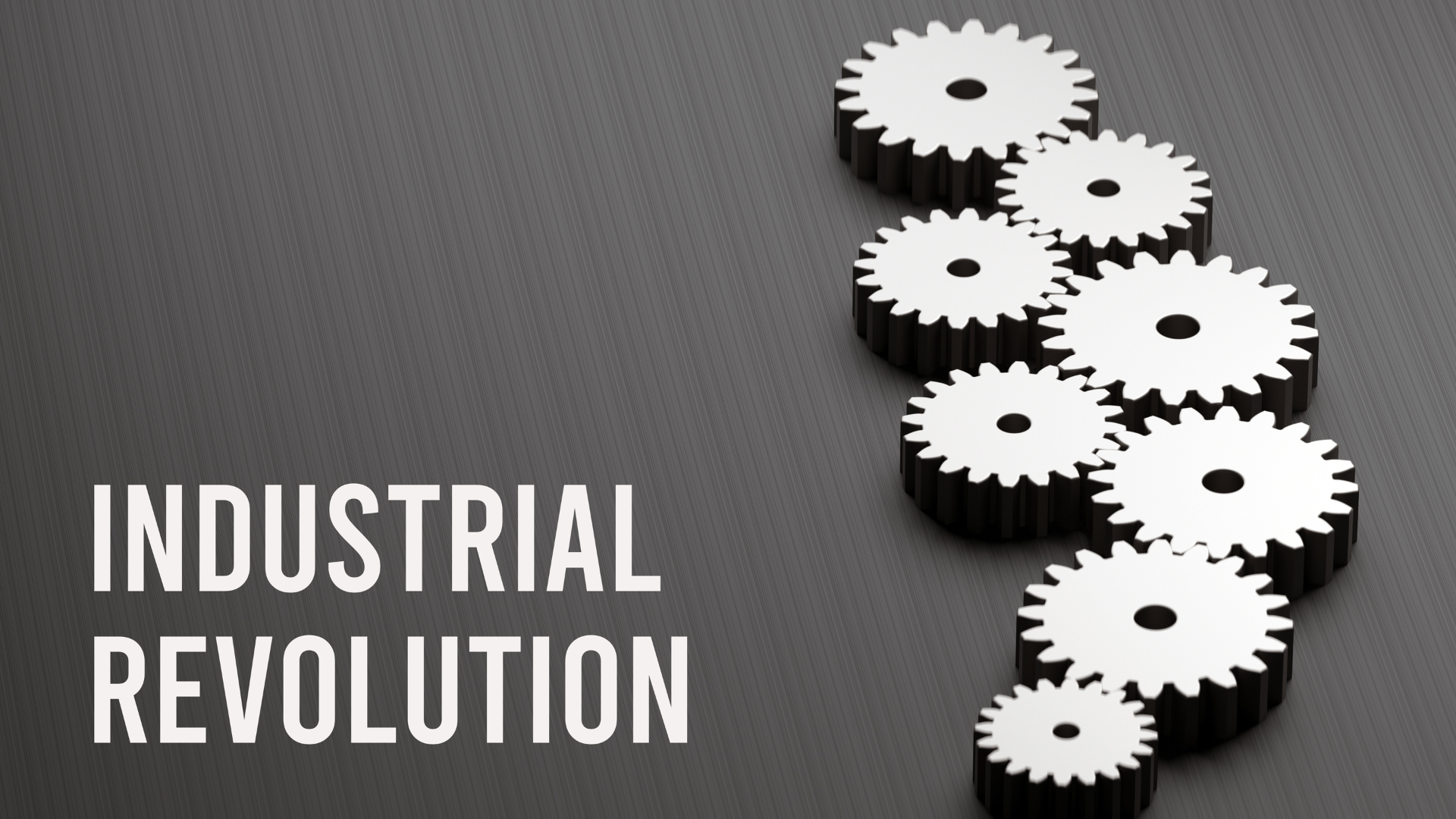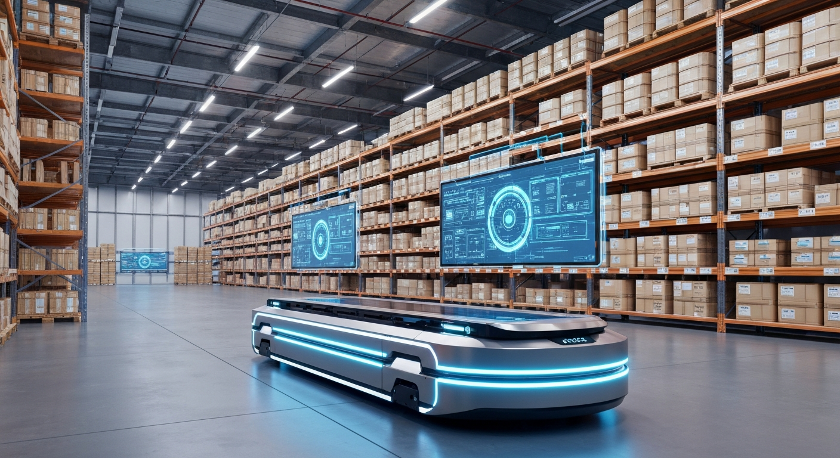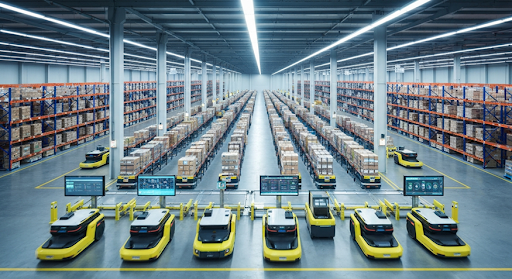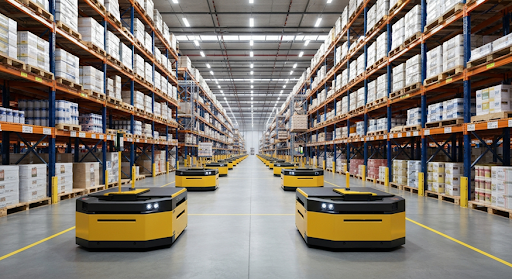Industry 4.0
Industry 4.0 signifies an undeniable paradigm shift in the manufacturing realm, representing the fourth industrial revolution. This transformative era focuses on harnessing the power of cutting-edge digital technologies to seamlessly integrate and optimize manufacturing processes. It is a game-changing phenomenon that holds immense potential for enhancing productivity, efficiency, and overall performance across industries. By embracing Industry 4.0, businesses can unlock unprecedented opportunities and gain a competitive edge in today's rapidly evolving landscape. This signifies a remarkable and highly significant leap towards full automation, seamless connectivity, and the adoption of data-driven decision making across various industries. It demonstrates a strong determination to embrace cutting-edge technologies and harness the power of data to drive impactful decisions that can revolutionize business operations and outcomes. This transformative shift is poised to bring about unprecedented efficiency, productivity, and innovation in industries worldwide.
The advent of Industry 4.0 is undeniably and completely revolutionizing the manufacturing and distribution landscape. It is a game-changer that is reshaping the entire industry from top to bottom, leaving no stone unturned. This groundbreaking technological advancement is disrupting traditional processes, bringing forth a new era of efficiency, productivity, and innovation. The impact it has on manufacturing and distribution cannot be overstated as it ushers in a new wave of automation, connectivity, and data-driven decision-making that will propel businesses forward into unparalleled success. Forward-thinking companies are actively and enthusiastically embracing cutting-edge technologies to revolutionize and optimize their operations, ensuring they remain at the forefront of a fiercely competitive market. By harnessing the power of these innovative tools, they gain a significant advantage over their rivals, paving the way for higher efficiency, greater productivity, and enhanced profitability. Manufacturers are actively and deliberately embracing cutting-edge technologies such as the Internet of Things (IoT), cloud computing, analytics, as well as powerful tools like AI and machine learning. It is evident that they are making a genuine effort to incorporate these state-of-the-art technologies into their operations, recognizing the immense benefits they bring to the table. By leveraging these advanced technologies, manufacturers can enhance their productivity, streamline their processes, and stay ahead of the competition in today's fast-paced and ever-evolving market. These remarkable advancements have an undeniably significant impact on revolutionizing and optimizing production facilities and operations to unparalleled levels of efficiency and effectiveness. The cutting-edge technologies incorporated in these advancements empower organizations to streamline their processes, enhance productivity, and achieve remarkable improvements in overall performance. With these advancements, production facilities can maximize output while minimizing costs, ensuring a competitive edge in today's dynamic market landscape.
To gain a comprehensive understanding of Industry 4.0, it is essential to clarify its profound significance. Industry 4.0 encapsulates a multitude of cutting-edge technologies and revolutionary concepts that empower the establishment of smart factories and interconnected systems. These advancements embody the future of industrialization, leveraging automation, data exchange, machine learning, and the Internet of Things (IoT) to elevate operational efficiency and revolutionize manufacturing processes. Industry 4.0 represents an unprecedented leap forward in industrial innovation that will shape the landscape of industries for years to come. The utilization of cutting-edge technologies like artificial intelligence, Internet of Things (IoT), big data analytics, cloud computing, and robotics is an imperative aspect of optimizing production processes and amplifying efficiency. These advanced technologies empower businesses to streamline their operations by harnessing the potential of automation, real-time data analysis, seamless connectivity, and intelligent decision-making. By integrating these technologies into their workflow, organizations can achieve unparalleled levels of productivity and effectiveness in their production processes.
The manufacturing industry is currently witnessing a groundbreaking revolution with the introduction of smart factories. These cutting-edge technological marvels are equipped with state-of-the-art sensors, embedded software, and highly efficient robotics that relentlessly gather vast amounts of data and perform detailed analysis. This combination of advanced technology not only enhances productivity but also optimizes processes, leading to unprecedented levels of efficiency and precision in the manufacturing sector. This empowers organizations to make informed decisions that drive significant improvements in their operations. By seamlessly integrating data from production operations with valuable insights from various systems such as ERP, supply chain, customer service, and other enterprise platforms, it unleashes a whole new realm of visibility and insight. This comprehensive approach enables businesses to gain deep understanding into their operations and make data-driven decisions that have a profound impact on overall efficiency and productivity. This integration revolutionizes the way information is accessed and utilized by demolishing the barriers that once separated various sources of valuable data. By seamlessly merging these previously isolated entities, it paves the way for significant value creation. The result is a comprehensive and interconnected system where information flows effortlessly, enabling organizations to harness untapped potential and make more informed decisions.
The applications of Industry 4.0 are not only vast, but they also extend far beyond the scope of just manufacturing. Industry 4.0 has revolutionized various sectors and industries, bringing forth a wave of technological advancements that have disrupted traditional processes and opened up new possibilities. From healthcare to transportation, from agriculture to logistics, Industry 4.0 has permeated virtually every aspect of our lives, empowering businesses and individuals alike with innovative solutions and improved efficiency. It is undeniable that the impact of Industry 4.0 goes well beyond the confines of manufacturing alone, offering limitless potential for growth and progress in a multitude of fields. Industries that are forward-thinking and truly committed to growth and efficiency, such as healthcare, transportation, energy, and logistics, stand to benefit immensely from adopting these advanced technologies. By embracing the power of AI-driven solutions, they can revolutionize their operations, streamline processes, and optimize resource allocation. The potential impact on these industries is nothing short of transformative – boosting productivity, reducing costs, improving safety standards, and enhancing overall customer satisfaction. It is crucial for leaders in these sectors to recognize the immense value that AI writing assistants bring to the table and take immediate action to incorporate them into their business strategies.
The manufacturing industry has a tremendous opportunity to embrace the fourth industrial revolution by developing smart factories. This technological advancement offers countless benefits and opens up exciting possibilities for manufacturers. By thoroughly analyzing the vast amount of big data gathered from factory floor sensors, you can gain instant visibility into your manufacturing assets. This enables you to proactively perform predictive maintenance, reducing equipment downtime to a minimum.
It is important to highlight that widely recognized sources, such as Wikipedia and industry literature, do not specifically mention the term "Industry 5.0." The absence of this term in such authoritative sources suggests that it may not be a widely accepted or commonly used term within the industry. Without a doubt, it is an undeniable fact that the integration of AI technology in the workplace represents a revolutionary leap forward, surpassing even the remarkable advancements brought about by Industry 4.0. The advent of AI brings with it a new era of innovation and progress, characterized by even more advanced and cutting-edge technologies that have the potential to reshape industries across the globe. It is not simply an evolution; rather, it is a seismic shift that promises to unlock unprecedented levels of productivity and efficiency in ways previously unimaginable.
Incorporating state-of-the-art IoT devices in smart factories unquestionably boosts productivity and elevates the quality standards. By adopting AI-powered visual insights, businesses can effectively replace manual inspection models. This switch not only helps in reducing manufacturing errors but also saves valuable resources such as money and time. Setting up a smartphone connected to the cloud is an affordable and efficient solution for quality control personnel. With this setup, they can easily monitor manufacturing processes remotely from any location. Manufacturers can utilize machine learning algorithms to detect errors right away, instead of waiting for later stages when repair costs are higher.
The concepts and technologies of Industry 4.0 can be implemented in various industrial sectors, such as discrete and process manufacturing, oil and gas, mining, and other segments.
First Industrial Revolution
The first industrial revolution, which began in late 18th century Britain, was instrumental in facilitating mass production. It accomplished this by harnessing the power of water and steam, rather than relying solely on human and animal labor. Machines were used to build finished goods instead of making them painstakingly by hand.
Second Industrial Revolution
The second industrial revolution, which occurred a hundred years later, brought about significant changes. Assembly lines were introduced and the utilization of oil, gas, and electric power became widespread. The introduction of these new power sources, along with advancements in telephone and telegraph communication, revolutionized manufacturing. Mass production and automation became possible, driving efficiency in manufacturing processes.
Third Industrial Revolution
The third industrial revolution, which kicked off in the mid-20th century, brought significant advancements to manufacturing processes. It introduced computers, advanced telecommunications, and data analysis into the mix. Factories started the digitization process by incorporating programmable logic controllers (PLCs) into their machinery. This allowed them to automate certain processes and efficiently gather and communicate data.
Fourth Industrial Revolution
Welcome to the fourth industrial revolution, commonly known as Industry 4.0. This era is defined by automation, smart machines, and smart factories which greatly enhance efficiency and productivity throughout the entire value chain thanks to valuable data insights. Manufacturers now have greater flexibility to meet customer demands through mass customization, aiming for efficiency even with individualized production. To achieve better decision-making and transparency, a smart factory can gather abundant data from the factory floor and integrate it with other operational data from across the enterprise. This enables greater visibility and more informed decisions.
Internet of Things (IoT)
Smart factories rely heavily on the Internet of Things (IoT) as a crucial element of their operations. Machines in the factory are fitted with sensors that have an IP address. This enables them to seamlessly connect with other web-enabled devices for efficient communication and coordination on the factory floor. Thanks to mechanization and connectivity, we now have the capability to collect, analyze, and exchange vast amounts of valuable data.
Cloud Computing
Cloud computing plays a crucial role in Industry 4.0 strategies. To fully embrace smart manufacturing, it is essential to have seamless connectivity and integration across various aspects such as engineering, supply chain, production, sales and distribution, and service. Cloud technology plays a vital role in making this all possible. It not only enables efficient processing of large volumes of data but also does so in a cost-effective manner. Cloud computing offers a cost-effective solution for small and medium-sized manufacturers to reduce their startup expenses. By providing the ability to tailor their resources according to their specific needs, businesses can easily scale up as they grow.
Edge Computing
In real-time production operations, data analysis needs to be conducted at the "edge" where the data is generated. This is necessary to address the demands of such operations. Minimizing latency time is essential to ensure timely responses. By reducing the delay between data production and response requirements, efficiency and effectiveness can be improved. When it comes to safety or quality issues, immediate action is crucial. Detecting such issues may call for near-real-time responses with the equipment. Reliability of the network plays a crucial role in determining the length of time required to send data to the enterprise cloud and back to the factory floor. This process can potentially take longer than desired, which may impact overall productivity. When you use edge computing, the data remains close to its source which helps in minimizing security risks.
Cybersecurity
Manufacturing companies must prioritize cybersecurity and cyber-physical systems to ensure the safety and integrity of their operations. While operational equipment in factories and fields (OT) undoubtedly improves manufacturing efficiency, it's important to note that it also opens up new avenues for malicious attacks and malware. This connectivity should be approached with caution and proper security measures must be put in place to mitigate potential risks. To successfully transition into Industry 4.0, it is crucial to adopt a comprehensive cybersecurity strategy that covers both IT and OT equipment. This approach will help safeguard your digital infrastructure and ensure the smooth operation of your business processes.
Digital Twin
Thanks to Industry 4.0, manufacturers now have the opportunity to leverage digital transformation and create virtual replicas known as digital twins. These replicas mirror processes, production lines, factories, and supply chains for enhanced efficiency and optimization. To create a digital twin, data is pulled from various sources such as IoT sensors, devices, PLCs, and other internet-connected objects. Digital twins offer manufacturers various benefits. By utilizing this technology, they can significantly boost productivity, enhance workflows, and effectively develop innovative products. Manufacturers can effectively test and optimize their production process by simulating it. This enables them to identify opportunities for minimizing downtime and increasing capacity.
Analyze Data for Optimal Decision Making
Manufacturing companies benefit greatly from embedded sensors and interconnected machinery, as they generate a substantial amount of valuable big data. Manufacturers can greatly benefit from data analytics as it enables them to thoroughly examine past trends, recognize patterns, and ultimately make informed decisions to enhance their operations. Smart factories have the capability to leverage data from various sources within the organization and its extended network of suppliers and distributors. This enables them to generate more profound insights for better decision-making. Manufacturers can leverage data from various departments such as human resources, sales, and warehousing to make informed production decisions. By analyzing sales margins and personnel data, manufacturers can optimize their production processes for greater efficiency and profitability. You can create a "digital twin" which is a comprehensive digital representation of operations.
IT or OT Integration
Interconnectivity is a critical factor in establishing the network architecture of a smart factory. Other factory assets can immediately utilize real-time data collected from sensors, devices, and machines on the factory floor. Enterprise software components, such as enterprise resource planning (ERP) and other business management software, can easily share information with each other. This allows for seamless integration and collaboration across the entire software stack.
Custom Manufacturing
Smart factories have the ability to produce customized goods in a cost-effective manner, meeting the specific needs of individual customers. Many manufacturers in various industries aim to achieve an economical "lot size of one". Manufacturers now have the ability to create customized items for specific customers by utilizing advanced simulation software applications and innovative technologies like 3-D printing. This allows them to effortlessly produce small batches of specialized products. Industry 4.0 is a significant shift from the first industrial revolution, as it focuses on mass customization rather than mass production.
Supply Chain
To ensure smooth industrial operations, it is crucial to have a transparent and efficient supply chain that seamlessly integrates with production operations. This integration plays a vital role in establishing a strong Industry 4.0 strategy. Manufacturers are undergoing a significant transformation in how they source raw materials and deliver their finished products. To improve delivery scheduling, manufacturers should share production data with suppliers. This will enable them to have a clearer understanding of their production capacities and plan deliveries more effectively. In the event of an assembly line disruption, it is essential to promptly address the issue. One effective solution is to reroute or delay deliveries in order to minimize both wasted time and costs. Companies can enhance their shipping operations by analyzing weather conditions, transportation partner and retailer data. By doing so, they can predict the optimal time to send finished goods in order to meet consumer demand effectively. Blockchain technology is playing a crucial role in enabling transparency within supply chains.
To fully embrace Industry 4.0 and drive digital transformation, manufacturers must prioritize the construction of a hybrid multicloud IT infrastructure. This is an essential component that enables them to harness the benefits of a diverse cloud environment while adapting to the latest technological advancements. Hybrid multicloud refers to the strategic use of multiple public and private clouds by companies to efficiently manage their computing workloads. Optimizing workloads across different clouds is possible, as certain environments are better suited or more cost-effective for specific tasks. This gives organizations the ability to make informed decisions on how to distribute their work efficiently. If manufacturers are seeking digital transformation and a secure, open environment, it is recommended that they transfer their current workloads from on-premises to the most suitable cloud environment available.
In conclusion, it is absolutely evident that Industry 4.0 is undeniably poised to revolutionize industries on a global scale. Through harnessing the remarkable advancements in technology, this transformative era will pave the way for the creation of exceptionally intelligent and remarkably efficient systems that will elevate production processes across various sectors to unprecedented heights.

